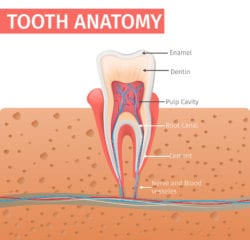Root Canal An Overview
 A root canal or endodontic treatment is performed when a tooth has become severely damaged or decayed, affecting the health of the internal tooth pulp, nerves or blood vessels. In some cases an abscess can form inside the tooth, causing sudden or throbbing pain. It is important to seek dental treatment as soon as possible if you experience any of the common signs that you may need a root canal.
A root canal or endodontic treatment is performed when a tooth has become severely damaged or decayed, affecting the health of the internal tooth pulp, nerves or blood vessels. In some cases an abscess can form inside the tooth, causing sudden or throbbing pain. It is important to seek dental treatment as soon as possible if you experience any of the common signs that you may need a root canal.
Dr. Shruti Chahal can perform a root canal to save your natural tooth from extraction at Foothills Dentistry in Calgary. This is the best treatment to save the natural tooth when the pulp chamber becomes infected. Saving the tooth is better for your oral health versus having it extracted. We have extensive experience providing this general dental treatment for patients of all ages.
Common signs that you may need a root canal can include:
- Change in the color of a tooth, often becoming gray looking
- Sudden tooth pain, severe discomfort that may be localized
- Trauma
A successful root canal treatment can help stabilize your dental health and your bite, keeping your natural teeth and bite structure in place. Dr. Chahal has in office digital technology for evaluating the health of your tooth, gums and surrounding oral structures.
A thorough exam and evaluation are the key to making the most appropriate treatment recommendation and the best possible outcome. Patients needing a root canal can benefit from our comprehensive dental services that enable complete treatment to be offered in our office, avoiding the need to travel to a specialist for care.
